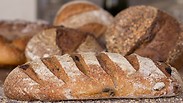“We don’t sell chametz, except for cakes and cookies” says a representative from the Tel Aviv branch of Arcaffe coffee shop.
In Landwer coffee shop in the cinema city complex in Rishon LeZion, a kosher carrot cake sits on display aside a non-kosher cake as a barman pours beer for his guests.
Such images of kosher meals for Passover next to pure chametz has become an increasingly common sight during the festival, and unlike in the past, not only in Tel Aviv. In 2016, anyone wishing to continue eating chametz during the Jewish holiday can do so throughout Israel without exerting too much effort. Quietly and without protest, the status-quo in Israel has changed.
The basis for the slow change in this status quo is attached to 1986 legislation which deals with the subject called the “Law of Unleavened Bread,” also known as the “Chametz Law” which prohibits the the display "for sale or consumption" of hametz during Passover. The law is enforced by special inspectors from the Interior ministry as the festival approaches.
However, for many years the inspectors have not been appointed and those who have been, were predominantly selected by local authorities. This year, Interior Minister Aryeh Deri announced that the authority to enforce the law does not rest with the Interior Ministry but rather with the local inspection authorities and that, in practice, responsibility for handling cases in which hametz has been sold lies with the same local authorities. As shown during a Yedioth Ahronoth inspection, the inspectors provide tacit consent and turn a blind eye to chametz.
It is not possible to find chametz in the big supermarkets. However each year the smaller chains are widening their range of chametz products which they continue to sell during the holiday. Indeed, most have already forfeited their religious consumers as they remain open on Shabbat and do not hold a certificate of Kashrut.
On the other hand, there are restaurants which continue to offer their customers chametz dishes unafraid of enforcement of the law. The largest change has taken place in Israel’s coffee shops. Yedioth Ahronoth reporters visited several coffee shops in different cities and came across a large number of cafes and food establishments, some of which stringently adhere to the religious laws of Passover and some of which adjust their menus in order to serve a diverse customer base. “We serve a range of options for our customers,” said the cafe chain Landwer.
“There are those chains that are kosher and have a menu which is kosher for Passover, and also those which have regular menus with an option to choose items without chametz, for example rolls which are kosher for Pesach etc,” Yedioth Ahronoth was told by Landwer.
Cafe chain Lechem Erez also said that while nine of their branches continue to operate on Passover Chol Hamoed “the remaining three don’t serve chametz at all on Chol Hamoed. Moreover, the chain makes a special Passover menu.”
A similar response was given by the Arcaffe cafe chain: “We recommend a kosher for Passover menu for our customers. In a number of branches in central Tel-Aviv we allow them to enjoy a variety of kosher products in addition to regular product,” they said.
Cafe Cafe emphasized the that while some of their branches observe different levels of kosher standards, none of them serve chametz. “There are branches that are strictly kosher and there are those which are kosher for those who eat kitniyot (legumes which Ashkenazi Jews do not eat during Passover -ed.). There are branches that have no traces of kitniyot and then there are indeed those where the kitchen is not kosher for Pesach but which, at the same time, don’t serve chametz throughout the festival.”
Cafe giant, Aroma in Tel Aviv said, “We are there for all strands of the population and obviously certain chain branches make special menus appropriate for Passover alongside of the regular ones. In addition, we have branches that have undergone all requirements for Passover.” Indeed,Yedioth Ahronoth's inspections found that Aroma did not sell chametz during the holiday.
Iris Lifshitz-Klieger, Edva Cohen, Danny Adino Ababa, Meir Turgeman, Lior El-Chai, Iliana Curiel and Eitan Glickman contributed to this report.
מומלצים


















